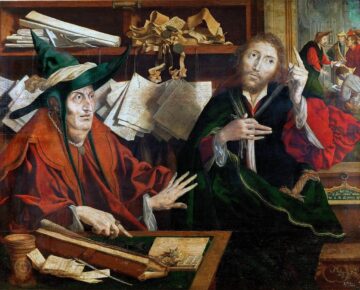Franciscan Friar Fr. Paul Gallagher reflects on the Gospel for the Twenty-fifth Sunday of Ordinary Time, September 18, 2022. The content is edited by Franciscan Sister of Christian Charity Sister Anne Marie Lom and Joe Thiel. The excerpts from the Sunday readings are prepared by Joe Thiel. To read or download the complete pdf with excerpts for your prayer, please click here: Franciscan Gospel Reflection September 18 2022. Excerpts are from the Lectionary for Mass for Use in the Dioceses of the United States of America, second typical edition © 2001, 1998, 1997, 1986, 1970 Confraternity of Christian Doctrine, Inc., Washington, DC. Used with permission. All rights reserved. No portion of this text may be reproduced by any means without permission in writing from the copyright owner. Photo: https://commons.wikimedia.org/wiki/File:Print,_book-illustration_(BM_1982,U.3315).jpg; https://commons.wikimedia.org/wiki/File:Parable_of_the_Unjust_Steward_Marinus_van_Reymerswaele.jpg
Luke 16:1-13 (The short form is Luke 16:10-13, the italicized section)
 Jesus said to his disciples, “A rich man had a steward who was reported to him for squandering his property. He summoned him and said, ‘What is this I hear about you? Prepare a full account of your stewardship, because you can no longer be my steward.’ The steward said to himself, ‘What shall I do, now that my master is taking the position of steward away from me? I am not strong enough to dig and I am ashamed to beg. I know what I shall do so that, when I am removed from the stewardship, they may welcome me into their homes.’ He called in his master’s debtors one by one. To the first he said, ‘How much do you owe my master?’ He replied, ‘One hundred measures of olive oil.’ He said to him, ‘Here is your promissory note. Sit down and quickly write one for fifty.’ Then to another he said, ‘And you, how much do you owe?’ He replied, ‘One hundred kors of wheat.’ He said to him, ‘Here is your promissory note; write one for eighty.’ And the master commended that dishonest steward for acting prudently. “For the children of this world are more prudent in dealing with their own generation than are the children of light.
Jesus said to his disciples, “A rich man had a steward who was reported to him for squandering his property. He summoned him and said, ‘What is this I hear about you? Prepare a full account of your stewardship, because you can no longer be my steward.’ The steward said to himself, ‘What shall I do, now that my master is taking the position of steward away from me? I am not strong enough to dig and I am ashamed to beg. I know what I shall do so that, when I am removed from the stewardship, they may welcome me into their homes.’ He called in his master’s debtors one by one. To the first he said, ‘How much do you owe my master?’ He replied, ‘One hundred measures of olive oil.’ He said to him, ‘Here is your promissory note. Sit down and quickly write one for fifty.’ Then to another he said, ‘And you, how much do you owe?’ He replied, ‘One hundred kors of wheat.’ He said to him, ‘Here is your promissory note; write one for eighty.’ And the master commended that dishonest steward for acting prudently. “For the children of this world are more prudent in dealing with their own generation than are the children of light.
I tell you, make friends for yourselves with dishonest wealth, so that when it fails, you will be welcomed into eternal dwellings. The person who is trustworthy in very small matters is also trustworthy in great ones; and the person who is dishonest in very small matters is also dishonest in great ones. If, therefore, you are not trustworthy with dishonest wealth, who will trust you with true wealth? If you are not trustworthy with what belongs to another, who will give you what is yours? No servant can serve two masters. He will either hate one and love the other, or be devoted to one and despise the other. You cannot serve God and mammon.”
Background:
The gospel from last week told of sinners and tax collectors drawing near Jesus. But the Pharisees and the scribes complained about Jesus’ association with these people. In response, Jesus told the three parables of the lost sheep (Luke 15:4-7), the lost coin (Luke 15:8-10), and the lost son, commonly referred to as Prodigal Son (Luke 15:11-32). That well-known parable ends with the father telling his oldest son, “Now we must celebrate and rejoice, because your brother was dead and has come to life again; he was lost and has been found.” (Luke 15:32)
 What follows in Luke’s gospel is the parable of the dishonest steward (Luke 16:1-8) which is followed by a string of sayings that seems to interpret the parable (Luke 16:9-13). It may be helpful to know that today’s gospel leads into another familiar parable that also focuses on the right use of wealth, the Parable of the Rich Man and Lazarus. That parable will be the gospel text for next Sunday, the 26th Sunday in Ordinary time. This Sunday the focus is the parable of this steward and how he uses his master’s wealth.
What follows in Luke’s gospel is the parable of the dishonest steward (Luke 16:1-8) which is followed by a string of sayings that seems to interpret the parable (Luke 16:9-13). It may be helpful to know that today’s gospel leads into another familiar parable that also focuses on the right use of wealth, the Parable of the Rich Man and Lazarus. That parable will be the gospel text for next Sunday, the 26th Sunday in Ordinary time. This Sunday the focus is the parable of this steward and how he uses his master’s wealth.
For many, even most, this parable is difficult to understand, because the owner seems to be rewarding the steward for behavior that is contemptible and illegal. Hopefully this will make it more apparent that the parable is coming out of a culture that is very different than our own and therefore is an invitation to grow in appreciation of the culture and the times from which the parable comes.
It might be helpful to point out that in the gospel from last Sunday the eldest son spoke of his brother as the son who had returned after having swallowed up their father’s property. Other texts translate “swallowed up” as squandered, the same word used to describe what the steward had done with his master’s property that led to his dismissal. This too should help raise some questions and the need to look at this parable anew.
The steward is expected to manage his master’s resources in a way that will benefit his master. The text does not say he has cheated his master, only that he squandered his property, and therefore he is being relieved of his responsibilities. He could have been fined and asked to return whatever property the master feels was lost by his mismanagement, or even be taken to court which would have been a much more public and legal transaction.
Before his dismissal becomes public, the steward decides to use the time to his advantage. As steward he has the authority to make agreements for his master. He calls in two men who have agreements with his master for how they are to pay him for the use of his land. In both cases they are to pay a fixed amount in rent. Perhaps partly inspired by his master’s generosity and partly inspired by his desperate situation, the steward reduces the payment significantly in both cases. This will create a relationship with each where they are bound in some way to repay the steward after he is dismissed.
At the same time, it also creates a great deal of good will toward his master. Social norms of the day would require the two debtors to make known the generosity of the master. As the story is told and retold, the master’s esteem within the community rises. If now the master dismisses his servant and reveals the dishonesty of his servant, his reputation is then negatively impacted. Instead, the master commends his dishonest servant for acting prudently.
How has this steward acted prudently? The rest of Jesus’ exhortation sheds some light on the prudent use of wealth. The master in the parable was going to dismiss his servant because he squandered his property. He too is thinking like the elder son who sees property as possessions to be accumulated. Both the steward and the prodigal’s father see property as a way to build relationships and to be shared. In this light, the other saying in the gospel enhances this perspective on the right use of wealth and property.
Jesus’ values as he teaches those who would be his disciples are meant to be a challenge that is succinctly stated in the last line of the gospel: “You cannot serve God and mammon.”
Reflection Questions:
- When you think about wealth and the wealthy, what kind of images and feelings come to mind?
- The steward in the gospel was reported for “squandering” his master’s wealth. What do you think he was doing?
- Why do you think his master didn’t have him put in prison or demand that he be repaid?
- In the last week, have you used wealth to build relationships?
- Have there been times when others might have looked at your actions as squandering the wealth in your possession?
- What could you learn from the master in this gospel parable? What could you learn from the steward?
- The steward in this parable says of himself that he is not strong enough to dig and too proud to beg. Are you able to be equally honest with yourself about your limitations?
- Can you take some time now to talk with God about how you use the wealth at your disposal, your desire to be single-minded, or some of the emotions that rose within you as you reflected on this gospel?


